|
|
|
Sort Order |
|
|
|
Items / Page
|
|
|
|
|
|
|
| Srl | Item |
| 1 |
ID:
092140
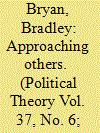

|
|
|
|
|
| Publication |
2009.
|
| Summary/Abstract |
The essay sheds light on Aristotle's understanding of friendship and its relation to political life.The author challenges the usual view that Aristotle postulates three distinct kinds of friendship. Instead the author argues that Aristotle understood there to be only one kind of friendship, and that other "friendships" were to Aristotle "unfinished" and thus not friendship at all. Aristotle shows that the relation between friendship and politics is grounded in friendship's possibility for human beings, and not as something cherished for its actuality. By looking at proper friendship as possibility and not actuality, we could only ever interpret the infamous statement attributed to Aristotle-"my friends, there are no friends"-not as illuminating of what friendship is but rather as a nostalgic diagnosis of the decay of the possibility of friendship, and hence of politics. By extension, and more poignantly, interpreting Aristotle's work on friendship in this light, we stand ready to reinterpret the mobilization of Aristotelian friendship for contemporary understandings of democratic practice.
|
|
|
|
|
|
|
|
|
|
|
|
|
|
|
|
| 2 |
ID:
143296


|
|
|
|
|
| Summary/Abstract |
Little is known about the attitudes of migrant populations originating from countries affected by conflict. This article examines a key assumption in the literature: that migrants harbor more conflictive attitudes than locals after war. Until now, we simply lacked the micro-level data necessary to examine migrant attitudes directly. Rather than relying on indirect evidence, I analyze new data from simultaneous surveys conducted in Sweden and Bosnia in 2010. As a whole, the empirical analysis supports the article’s novel theoretical approach. Under certain conditions, migration may promote inclusive and reconciliatory attitudes by improving access to coping resources and providing an exit from detrimental wartime and postwar conditions in origins countries.
|
|
|
|
|
|
|
|
|
|
|
|
|
|
|
|
| 3 |
ID:
165755
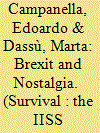

|
|
|
|
|
| Summary/Abstract |
An infatuation with a distorted past deluded millions of British citizens and hundreds of pro-Brexit politicians about the future of their country outside Europe.
|
|
|
|
|
|
|
|
|
|
|
|
|
|
|
|
| 4 |
ID:
188752
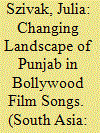

|
|
|
|
|
| Summary/Abstract |
Music has played an integral part in defining the sense of self for Punjabis at home as well as in the national and transnational diasporas. The images of the homeland have played a significant role in shaping the imagery of Punjabi music, therefore it is self-explanatory that Bollywood music has also incorporated a vast number of references to Punjabi localities when representing Punjab on screen. This paper investigates the representation of Punjab in Bollywood music through a textual analysis of a variety of Bollywood songs that discuss the imaginary and real landscapes of Punjab. I suggest that the image of Punjab has played an important role in post-liberalisation popular culture in India—however, the exact nature of this image has undergone significant change. Traditionally, the representation of Punjabi culture was tied to poetic and visual images of the landscape of Punjab and was used to evoke nostalgia and a bucolic idyll. However, recently, Punjabi culture has been dislocated from the land itself and represented as part of a global culture of aspiration and consumerism.
|
|
|
|
|
|
|
|
|
|
|
|
|
|
|
|
| 5 |
ID:
134183
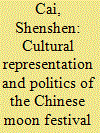

|
|
|
|
|
| Publication |
2014.
|
| Summary/Abstract |
Nationalism in various forms has been a fixture of modern Chinese politics and society; however, its form has changed and over the past decade or so, the CCP has begun to appropriate China's cultural nationalism through its extensive use of propaganda and by other less nefarious methods. This paradigm shift embodies the deliberate manoeuvring that state nationalism is exerting on cultural symbols, concepts and legacies in China. Through imagery and emotionally laden political marketing that favour Party policy and rule, this form of nationalism surreptitiously caters to the cultural tastes of, and appeals to, the emerging middle class of contemporary Chinese society. It is a more nuanced and creative type of propaganda. Using the 2009 China Central Television (CCTV) Moon Festival (Mid-Autumn Festival) Gala as a case study, this paper examines Party-state appropriations of cultural nationalism. The Gala is a rich reservoir of moon-inspired traditional Chinese cultural elements, and the intriguing manoeuvring of these culturally bound images and iconography signifies a new propaganda strategy that combines poetic nostalgia, poignant romance and abstract philosophical pursuit, through which cultural elements are skilfully woven into a patriotic and nationalist appeal. These traditional cultural signifiers, illusions and fantasies serve the Party's political aims as it attempt to reinforce its legitimacy by forging a culturally bound national identity.
|
|
|
|
|
|
|
|
|
|
|
|
|
|
|
|
| 6 |
ID:
143106
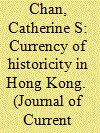

|
|
|
|
|
| Summary/Abstract |
In the 1980s, as the end of the millennium approached, the production of nostalgia exploded all around the world. For Hong Kong, nostalgia became a reminder of the golden age that had transformed the city into one of the “Four Asian Tigers” in the decades following the end of the Second World War. While yearning for the better days of the past, Hong Kong coincidentally experienced destabilisation. As the rest of the world, especially the “baby boomers,” mourned the end of a productive era, Hong Kong locals were disturbed by the affirmation of the handover to China in 1997. In the context of these events, a creative rush to nostalgia in cultural manufacturing swept across the city. In the hope of highlighting the uniqueness of nostalgic production in Hong Kong, this study analyses two sets of TV commercials produced by local beverage company Vitasoy. Through the deconstruction of selected historical events, Vitasoy successfully reinvented its brand and, in contrast to general criticism of the concept, generated a positive connotation for nostalgia on the path towards Hong Kong’s search for an identity.
|
|
|
|
|
|
|
|
|
|
|
|
|
|
|
|
| 7 |
ID:
144172
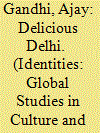

|
|
|
|
|
| Summary/Abstract |
This article examines how Old Delhi is represented and recreated in contemporary India. Delhi’s old city was once the locus of pre-colonial Mughal sovereignty. It is now often encountered via nationalist spectacles, mass-media images and consumption practices. Paralleling neo-liberalism’s onset in the 1990s, its street food, bazaar spaces and historical monuments have been avidly appropriated by reigning institutions and classes. Old Delhi suggests that which the new India has left behind; yet this displacement also elicits longing for what has been lost.
This medieval remnant can therefore be considered the site of nostalgia consumed by a globalised middle class. This article presents an ethnography of Old Delhi’s invocation in New Delhi’s cultural landscape, including malls, newspapers, heritage sites, hotels, and food courts. In triangulating among the realms of nationalist nostalgia, middle-class identity and mediated consumption, it emphasises how India’s neoliberal emergence is bound up with the co-opting of the past.
|
|
|
|
|
|
|
|
|
|
|
|
|
|
|
|
| 8 |
ID:
123192
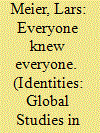

|
|
|
|
|
| Publication |
2013.
|
| Summary/Abstract |
This article explores the transformation of a community and its diversity as narrated by former industrial workers from a neighbourhood in Nuremberg, in a context in which company-based social housing of workers had been replaced by private rented accommodation accessed by middle class residents of migrant backgrounds. In biographical interviews, narratives emerge in which diversity and social difference are not seen as ethnic difference, but rather as a power difference within an established-outsider figuration. In this figuration, heterogeneous past and present cultural practices are homogenised through community control and regulation along normative rules as defined by the established. Workers' nostalgic laments for the loss of their former status show that figuration of established and outsiders is dynamic, opening up new ways of thinking about diverse place-making and alternative perspectives on urban gentrification.
|
|
|
|
|
|
|
|
|
|
|
|
|
|
|
|
| 9 |
ID:
096479
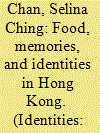

|
|
|
|
|
| Publication |
2010.
|
| Summary/Abstract |
This article adopts a processual and relational approach to study food remembrance and investigates how different ways of appropriating food reveal the politics of identities in Hong Kong. It examines how food memories reveal relationships between the past and the present, reflect epochal transformation, and mark changing identities of various groups of people through new ways of appropriations. It takes the case study of pancai, a special banquet food for the villagers in the New Territories of Hong Kong, to examine the relationships between food and identities. This article investigates how pancai is remembered, popularized, and reinvented with different variations and embodies shifting meanings for the New Territories inhabitants as well as other Hong Kong people in changing socioeconomic and political environments. Pancai has been imbued with multiple layers of significance, involving linkages between local and national, emigration and Chineseness, urbanization and rural heritage, as well as decolonization and identity politics. As identities are by nature negotiable, situational, and fluidic, pancai's multiple layers of meanings correspond to different levels of identities-identities of the New Territories inhabitants, the rest of the Hong Kong people, and the mainland Chinese.
|
|
|
|
|
|
|
|
|
|
|
|
|
|
|
|
| 10 |
ID:
161390
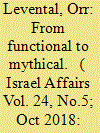

|
|
|
|
|
| Summary/Abstract |
This article seeks to analyse and portray the mythologisation of sport venues in Israel through a close examination of the particular case study of Ussishkin basketball arena in Tel Aviv. Notwithstanding the current lack of Israeli mainstream recognition of sport places as a built cultural heritage, it is argued that the Ussishkin arena demonstrates the extensive social implication carried by those seemingly functional facilities, not exclusively during their ongoing operation but as a timeless nostalgic and symbolic icon. While the mythical aura is confined to the sports fans’ view of those places, the cultural discourse is no longer conducted within the narrow boundaries of the sports media. The magnitude of the fans’ resistance in the case of Ussishkin arena assured that it would be considered in any future debate regarding the social relevance of sport facilities to the urban fabric.
|
|
|
|
|
|
|
|
|
|
|
|
|
|
|
|
| 11 |
ID:
164377
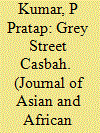

|
|
|
|
|
| Summary/Abstract |
In this paper, I wish to explore the life in the mid-19th to 20th century in the Durban-based Indian Casbah and its enduring legacy. In exploring the Casbah life in Durban, I wish to pay special attention to the narratives of the people who either were associated with it and had living memories of it, or remember the many stories passed on to them by their families.1 The central question that I explore in analysing these narratives is: does Casbah in the diaspora enable the diasporic community to reconnect with their Indian origins or does it orient them away from the romantic attachment to the places of their origin in India? In other words, is Casbah a symbol of a new settlement in which the diasporic community finds lasting meaning and legacy, or does it evoke memories and myths about their origins in India?
|
|
|
|
|
|
|
|
|
|
|
|
|
|
|
|
| 12 |
ID:
160019
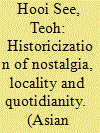

|
|
|
|
|
| Summary/Abstract |
This article seeks to shed light on Lim Kim Chern’s gastronomic writing, by ensconcing this individual case in the context of Modern Chinese Prose as an enduring literary tradition, in order to elicit the attribute of locality with diasporic discourse in quotidian life, that distinguishes it as part of a work in Malaysian Chinese Literature than the others. We will further this quest, by comparing the gastronomic writing of Lim before and after the changes in his literary pursuit in gastronomic writing, namely, by the comparison of the literary hierarchy of high-brow literature and the sub-genre of literature that post-positions the literariness, in order to examine whether or not it is a revelation, or even a harbinger of the fate of Malaysian Chinese Literature being minor literature.
|
|
|
|
|
|
|
|
|
|
|
|
|
|
|
|
| 13 |
ID:
107539
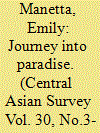

|
|
|
|
|
| Publication |
2011.
|
| Summary/Abstract |
In 2003, a Tajik film crew was permitted to cross the tightly controlled border into Afghan Badakhshan in order to film scenes for a documentary entitled Sacred Traditions in Sacred Places. Although official Tajik state policies and international non-governmental organizations have increasingly stressed freer movement and greater connectivity between the two sides, this 'prescribed community' strongly contrasts with the lived experience of Tajik Badakhshanis. This article explores narratives of nostalgia and dissonance reflected in the film itself and recounted by the film crew in interviews during film production and screening. Engaging with existing work on the interpretation and temporalization of space and post-Soviet nostalgias, I claim that this particular nostalgia emerges in response to new configurations of power and newly imposed pressures valuing cross-border movement. In this case, nostalgia serves as an affective resource helping Tajik Badakhshanis understand and manage daily life and the new potential for border crossing in a highly regulated border zone.
|
|
|
|
|
|
|
|
|
|
|
|
|
|
|
|
| 14 |
ID:
132623


|
|
|
|
|
| Publication |
2014.
|
| Summary/Abstract |
Recently, I had the opportunity to listen to the farewell remark of a senior Marine officer. Many of his thoughts were the sort of things one might expect of a departing officer- some advice, a little retrospective on his command, and the like. What colored his remarks the most, though, was nostalgia. Nostalgia for Marines of 20 years ago who did what they were told without question. Nostalgia for days of moral clarity in the military. Nostalgia for a time that the corps and the military were better.
|
|
|
|
|
|
|
|
|
|
|
|
|
|
|
|
| 15 |
ID:
090681
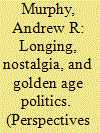

|
|
|
|
|
| Publication |
2009.
|
| Summary/Abstract |
I assess several politically powerful ways of drawing on the past in the search for solutions to problems in the present. To probe these dynamics, I turn to the American jeremiad, a longstanding form of political rhetoric that explicitly invokes the past and laments the nation's falling-away from its virtuous foundations. I begin by focusing on the Christian Right's traditionalist jeremiad, which offers both nostalgic and Golden Age rhetoric in its assessment of the United States' imperiled national promise. I argue that, despite differences in the historical location of their ideals and the significant rhetorical power that they bring to political life, such nostalgic and Golden Age narratives represent a constraining political ideal, one ultimately incapable of doing justice to an increasingly diverse American society. I argue furthermore that there is another strand of the American jeremiad and conclude by sketching a different way of drawing on the past, a progressive jeremiad epitomized by the thought of Abraham Lincoln and Frederick Douglass. Such a jeremiad is also deeply rooted in the American tradition and offers a far more promising contribution to a diverse and pluralistic American future.
|
|
|
|
|
|
|
|
|
|
|
|
|
|
|
|
| 16 |
ID:
133591
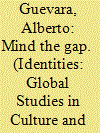

|
|
|
|
|
| Publication |
2014.
|
| Summary/Abstract |
A group of elderly women set up prayer camps in public roundabouts throughout Nicaragua's capital, Managua, to pray for 'peace and reconciliation.' A few miles away, in a humble barrio, escaping sexual discrimination and violence, a 24-year-old transvestite performs a sexually charged act in a circus. Meanwhile, across from the national parliament, hundreds of ex-agricultural workers exposed to the pesticide nemagon exhibit their dying flesh to the nation and the world in order to expose corporate greed and government inaction. These cases, happening under the new Sandinista regime, reflect a plurality of social spaces where theatricality, as the rhetorical manipulation of spaces and bodies aiming to affect publics, has become a mechanism for revealing the interstices of power relations in present day Nicaragua. This work explores various instances of linked and entwined government-sponsored and -sanctioned social performances of power and visibility, as well as other social performances that draw attention to the gap between the rhetoric of the government and social reality.
|
|
|
|
|
|
|
|
|
|
|
|
|
|
|
|
| 17 |
ID:
066094
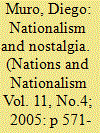

|
|
|
| 18 |
ID:
185331
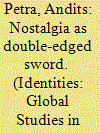

|
|
|
|
|
| Summary/Abstract |
Based on multi-sited ethnography, this article examines the return visits of Australian-Hungarian diaspora subjects after the fall of the Berlin Wall. In particular, it explores how nostalgia becomes an instrument for navigating the ambiguities, paradoxes, and disappointments of return and forging new and creative relationships with the home country. I argue that as much as nostalgia has contributed to the shattering of returnees’ illusions in the face of ‘reality’ upon returning, it has also helped them to facilitate deeper feelings of immersion with their home country. In this way, this article elucidates the restorative properties of nostalgia for identity and belonging.
|
|
|
|
|
|
|
|
|
|
|
|
|
|
|
|
| 19 |
ID:
097223
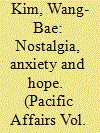

|
|
|
| 20 |
ID:
180011
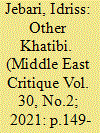

|
|
|
|
|
| Summary/Abstract |
The recent revival of interest in Moroccan thinker Abdelkebir Khatibi (1938–2009) around the English release of his seminal 1983 essay, Maghreb Pluriel represents an opportunity to place this thinker in the inner circle of post-1967 Arab thought. This article argues that most coverage and commemoration of him has been devoted to a glorified side of his trajectory that fits neatly within the framework of ‘postcolonial francophone intellectuals.’ However, this article argues that we must revise the meaning of his seminal book and his call for a ‘plural Maghreb’ to see it also as the demise of his project for a decolonized sociology in Morocco, which was necessary to set his sights toward semiology and his significant literary oeuvre. His example informs us on Arab intellectual strategies after the end of grand ideological narratives, and how to write Arab intellectual and cultural histories without succumbing to the trap of nostalgia.
|
|
|
|
|
|
|
|
|
|
|
|
|
|
|
|
|
|
|
|
|